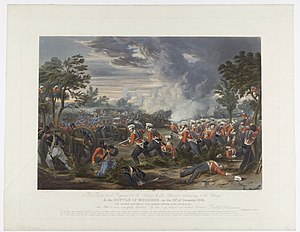Battle of Moodkee
| Battle of Mudki | |||||||
|---|---|---|---|---|---|---|---|
| Part of First Anglo-Sikh War | |||||||
 Battle of Mudki, by Henry Martens |
|||||||
|
|||||||
| Belligerents | |||||||
|
|
|
||||||
| Commanders and leaders | |||||||
| Lal Singh |
Sir Hugh Gough Sir Henry Hardinge |
||||||
| Strength | |||||||
| 10,000 - 22 guns |
10,000-11,000 42 guns |
||||||
| Casualties and losses | |||||||
| 215 killed 657 wounded |
|||||||
Coordinates: 30°47′N 74°53′E / 30.783°N 74.883°E
The Battle of Mudki was fought on 18 December 1845, between the forces of the East India Company and part of the Sikh Khalsa Army, the army of the Sikh Empire of the Punjab. The British army won an untidy encounter battle, suffering heavy casualties.
The Sikh Empire of the Punjab had been held together by Maharajah Ranjit Singh. Ranjit Singh had maintained a policy of friendship with the British East India Company, who held territories adjoining the Punjab, while at the same time building up the Khalsa, to deter aggression. When he died in 1839, the Sikh empire fell into increasing disorder. As several successive rulers and ministers were deposed or murdered, the army expanded and became increasingly restive. To secure their hold on power, some of the leaders in the Punjab goaded their army into a war against the British.
The Governor General of the Bengal Presidency (and in effect, of all British-controlled India) was Sir Henry Hardinge. Receiving reports of the disorder in the Punjab, he wrote late in 1845, "... it is evident that the Rani and the Chiefs are for their own preservation, endeavouring to raise a storm which, when raised, they will be powerless to direct or allay." He increased the British military force on the borders of the Punjab, stationing a division of 7,000 at Ferozepore, and moving other troops to Ambala and Meerut.
...
Wikipedia
